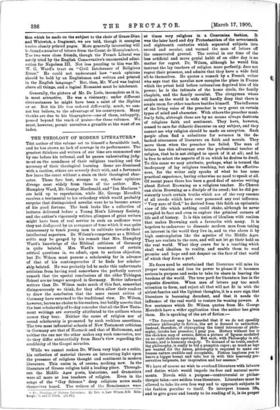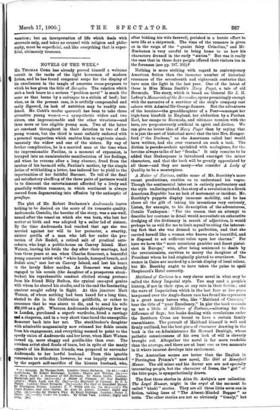THE THEOLOGY OF MODERN LITERATURE.* THE author of this volume
set to himself a formidable task, and he has shown no lack of courage in its performance. The greatest thinkers and writers of our time are summoned one by one before his tribunal, and he passes unhesitating judg- ment on the soundness of their religious teaching and the accuracy of their theological learning. Some are dismissed with a caution, others are severely dealt with, and a fortunate few leave the court without a stain on their theological char- acter. Those fare best, strange to say, whose opinions diverge most widely from those of the author. Mrs. Humphry Ward, Mr. George Macdonald, and "Ian Maclaren " are held np to reprobation, while Mr. George Meredith receives a testimonial to his orthodoxy which would probably surprise that distinguished novelist were he to become aware of his good fortune. The book looks like a collection of lectures delivered before a Young Men's Literary Society, and the author's vigorously written glimpses of great writers might have been of real service to such an audience were they not disfigured by an arrogance of tone which it was quite unnecessary to teach young men to cultivate towards their intellectual superiors. Dr. Wilson's competence as a Biblical critic may be gauged by his remark that Mrs. Humphry Ward's knowledge of the Biblical criticism of Germany is quite belated. Mrs. Ward's treatment of certain critical questions is, we admit, open to serious objection, but Dr. Wilson must possess a scholarship far in advance of that of his contemporaries if he finds her scholar. ship belated. He was probably led to make this unfortunate criticism from having read somewhere the perfectly correct remark that the special conclusions of the older Tubingen School are no longer accepted in Germany. Better informed writers than Dr. Wilson make much of this fact, somewhat disingenuously we think, for they often allow their readers to draw the conclusion that the more recent critics of Germany have returned to the traditional view. Dr. Wilson, however, leaves no choice to his readers, but boldly asserts that the best scholarship of to-day concedes that all the New Testa- ment writings are correctly attributed to the authors whose names they bear. Neither the cause of religion nor of sound scholarship is promoted by such reckless assertions. The two most influential schools of New Testament criticism in Germany are that of Harnack and that of Holtzmann, and neither the one nor the other makes any such concession, nor do they differ substantially from Baur's view regarding the credibility of the Gospel miracles.
While we cannot reckon Dr. Wilson very high as a critic, his collection of material throws an interesting light upon the presence of religions thought and sentiment in modern literature. This union is, of course, nothing new. In the literature of Greece religion held a leading place. Through- out the Middle Ages poets, historians, and dramatists were all more or less teachers of religion. Even in the songs of the "Gay Science" deep religious notes made themselves heard. The writers of the Renaissance were
T1, Theology of Modern Literature. By Rev. S. Law Wilson, D.D. Ellin• burgh : T. and. T. Clark. Lis. W.) at times very religions in a Ciceronian fashion. It
was the later hard and dry Protestantism of the seventeenth and eighteenth centuries which separated subjects into sacred and secular, and warned the man of letters off
the consecrated ground. The revival in our time of the less artificial and more genial habit of an older day is no matter for regret. Dr. Wilson, although he would fain
instruct the lay teachers of religion more perfectly, does not regret their presence, and admits that they have a wide field all to themselves. He quotes a remark by a French writer
who says that the novelist now occupies the place in France which the priest held before rationalism deprived him of his power; he is the intimate of the home circle, the family chaplain, and the family moralist. The clergyman whose outlook on the world is wide will hardly deny that there is ample room for other teachers besides himself. The influence of the living voice of the preacher is very great on certain types of mind and character. With others the preacher mani- festly fails, although these are by no means always destitute of religions faith and sentiment. They have, however, ceased to care for didactic discourse on any subject, and they
cannot see why religion should be made an exception. Bach people often find a substitute for sermons in the de- tached utterances of literature on faith and morals. They move them when the preacher has failed. The man of letters has this advantage over the professional teacher of religion, that he is not obliged to speak of it at all; and he is free to select the aspects of it on which he desires to dwell.
To this cause we may attribute, perhaps, what is termed the inadequacy of lay religious teaching, but also its effective- ness, for the writer only speaks of what he has some practical experience, having otherwise no need to speak at all. Of recent years there has been a good deal of unwise writing about Robert Browning as a religions teacher. No Church can claim Browning as a disciple of its creed; but he did per- sistently teach certain truths which are of the very essence of all creeds which have ever possessed any real influence. " Very sure of God," he derived from this faith an optimistic view of life which nothing could shake, although he never scrupled to face and even to explore the grimiest corners of life and of history. It is this union of idealism with realism that makes Browning such a favourite with many. It is hopeless to endeavour to dissuade modern men from taking an interest in the world they live in, and to rise above it by high contemplation like the mystics of the Middle Ages.
They are realists to the core, and will not let go their hold on the real world. What they crave for is a teaching which shall wed idealism to reality, and enable them to read promise and hope and not despair on the face of that world of which they form a part.
No fears need be entertained that literature will miss its proper vocation and lose its power to please if it becomes serious in purpose and seeks to take its share in bearing the burdens of the world. The true peril for literature lies in the opposite direction. When men of letters pay too much attention to form, and reject all that will not fit in with the airiest fancies and the lightest thoughts, it is a sure sign that literature is becoming decadent, and that it needs the influence of the real world to restore its waning powers. A few sentences which Dr. Wilson quotes from Mr. George Meredith have a wider application than the author has given them. He is speaking of the art of fiction
"The forecast may be hazarded that if we do not speedily embrace philosophy in fiction, the art is doomed to extinction. Instead, therefore, of objurgating the timid intrusions of philo- sophy, invoke her presence, I pray you. History without her is the skeleton map of events, fiction a picture of figures modelled on no right skeleton anatomy. But each, with Philosophy in aid, blooms, and is humanly shapely. To demand of us truth, exclud- ing philosophy, is really to bid a pumpkin caper; as much as legs are wanted for the dance, philosophy is required to make our human nature credible and acceptable. Fiction implores you to heave a bigger breast and take her in with this heavenly pre- servative helpmate, her inspiration and her essence."
We have of course no wish to overload literature with labours and duties which would impede its free and natural move-
ments. Novels with a purpose—controversial or philan- thropic tales—are seldom true literature. Literature must be allowed to take its own free way and to approach subjects in the fashion peculiar• to itself. To interpret human life, and to give grace and beauty to its reading of it, is its proper vocation; but an interpretation of life which deals with externals only, and takes no counsel with religion and philo- sophy, must be superficial, and like everything that is super- ficial, ultimately tiresome.

































 Previous page
Previous page